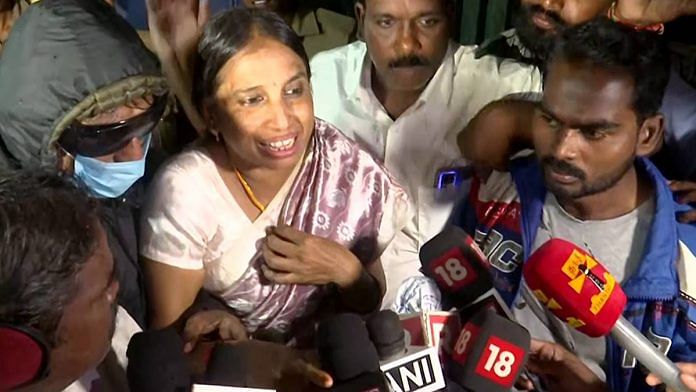New Delhi: Moving the Supreme Court (SC) against its 11 November order allowing remission of sentence of six convicts facing life imprisonment in former Prime Minister Rajiv Gandhi’s assassination case, the Union government Thursday appealed for a review on the ground that it had not been heard before the decision was taken.
Terming the apex court order a “miscarriage of justice”, the government contended that the six whose sentences were remitted could not be treated at par with A.G. Perarivalan, another convict in the case who was released in May by the apex court.
Back then the court had taken note of the fact that Perarivalan had moved a clemency petition before the Tamil Nadu Governor in 2015 and that the state cabinet had in September 2018 advised the head of the state to accept it, but despite the council of ministers’ “binding” advice, the Governor had forwarded the petition to the President, resulting in an inordinate delay in deciding his mercy plea.
The SC will now review its last week’s order under Article 137 of the Constitution, which allows the Court (just the SC or any court) to review its own judgment.
Meanwhile, the Congress has slammed the Modi government’s review appeal to the Supreme Court, calling it “belated wisdom drawing”.
Gandhi was assassinated by the Liberation Tigers of Tamil Eelam (LTTE) in May 1991 while campaigning for an election in Tamil Nadu’s Sriperumbudur.
While the suicide bomber was killed in the attack, seven people — Nalini, Ravichandran, Santhan, Murugan, Robert Payas and Jayakumar and Perarivalan — were sentenced to life imprisonment in the case. While four of the seven had initially been sentenced to death, it was later commuted to life.
After Perarivalan’s release in May, Nalini and Ravichandran approached the Madras HC seeking the same relief. However, the HC had said it did not have special powers like the top court, and that the petitioners must approach the SC.
ThePrint looks at the issues raised by the Central Government against the SC order.
Also read: Take care, Rajiv Gandhi told Prabhakaran. Even gave bulletproof vest before Sri Lanka Accord
Procedural lapses, natural justice
Contending that the remission order was passed without affording the union government “adequate opportunity” to oppose it, the Union govt submitted that it was a necessary party to the litigation.
The government also claimed that while the court had directed the petitioners to make it a party to the dispute, no application was filed to facilitate that.
This, the government submitted, was a “procedural lapse” on the part of the petitioners leading to an absence of assistance from the government. Crucial facts which were in the possession of the government were not presented, leading to manifest errors in the Court’s judgment, it said.
“Non presentation of such crucial facts, going into the root of the matter has resulted in patent and manifest errors apparent on the face of record creeping into the final judgment passed by this Hon’ble Court.”, the government submitted.
It added that since the union government could not present its case before the court, it was a breach of the principle of natural justice, leading to miscarriage of justice.
No parity, international ramifications
The Union government has also pointed out that four of the six convicts whose sentences were remitted last week are Sri Lankan nationals and that suspending sentences of terror convicts who are foreign nationals has international ramifications, the consequences of which fall within the Union’s domain.
“It is submitted that in such a sensitive matter the assistance of the Union of India was of paramount importance as the matter has huge repercussions on the public order, peace, tranquility and criminal justice system of the Country,” the government said in its review petition.
Opposing the reliance on Perarivalan’s case, the government raised the issue of a majority of the six appellants being foreign nationals, unlike Perarivalan, and had a “distinct and more serious” role in the assassination than him.
The government also pleaded for an “open hearing” against one in chambers — which is considered more confidential. According to Supreme Court rules a review petition is heard by judges in chambers, through circulation — without lawyers being present — but in exceptional circumstances the court can hear a review petition in open.
Akshat Jain is a student at the National Law University, Delhi, and an intern with ThePrint.
(Edited by Poulomi Banerjee)
Also read: ‘SC gave medicine for our wounds’ — no tears or hugs, just relief for Rajiv Gandhi killers



